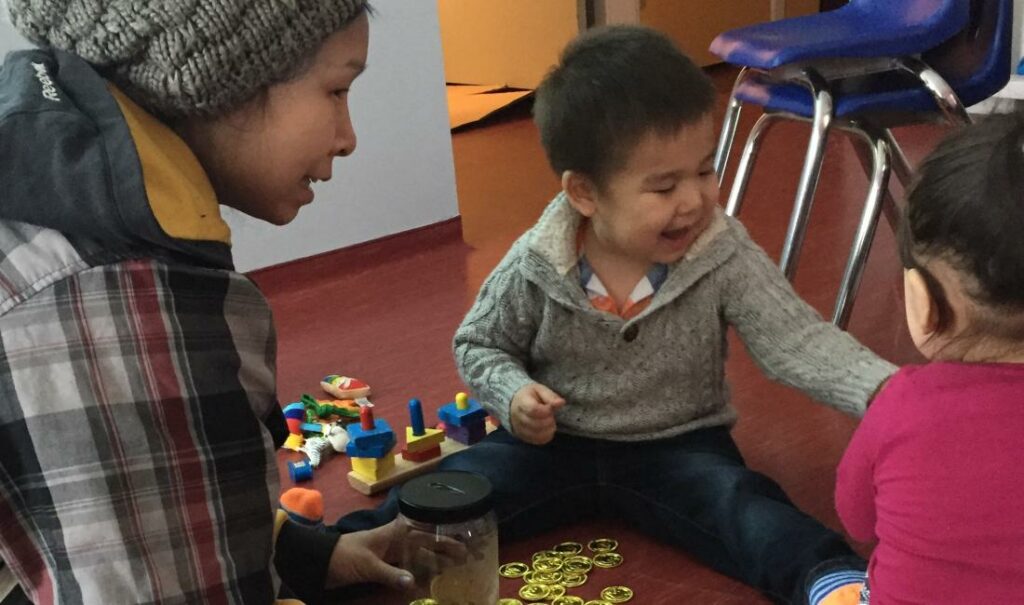Early (Childhood) Intervention Program
If you want to learn more about the Early (Childhood) Intervention Project and what’s happening in your community, please contact:
Health & Wellness Division Prenatal and Early Childhood
Inuvialuit Regional Corporation
107 Mackenzie Road
Bag Service #21
Inuvik, NT X0E 0T0
Email: mstorr@inuvialuit.com
Phone:
- (867) 777-7088
Fax:
(867) 777-4023
The Early (Childhood) Intervention Project with IRC’s Health & Wellness, is aimed at improving the process and outcomes of early childhood education by (1) improving children’s attendance and readiness for school in the communities; (2) improving the delivery of quality service in the Child Development Centres and; (3) enhancing support and understanding of the intervention of stages, sequences and milestones for social, emotional, physical and intellectual development of children aged 0-12.
Inuvialuit Early Childhood Program applications are now available online for parents and guardians to complete, with centres across the ISR open for children in September after the long weekend!
Go directly to the new, fillable online form.
Part of IRC’s Health & Wellness Division, the Early (Childhood) Intervention Program is aimed at improving the process and outcomes of early childhood education by improving (1) children’s attendance and readiness for school; (2) the delivery of quality service in the Child Development Centres and; (3) enhancing support and understanding of the intervention of developmental stages, sequences and milestones for social, emotional, physical and intellectual development of children aged zero to 12. This is funded through a three-year contribution agreement between Inuvialuit Regional Corporation and Government of the Northwest Territories.
In the first year (2015/2016), in partnership with the Beaufort-Delta Health and Social Services Authority rehab department and speech and language pathologists, the focus was on delivering a modified version of Hanen Training (Learning Language & Loving It) in four modules to staff in the centres. In this way, staff have the strategies, skills and knowledge to support children’s social language and literacy development.
In this second year (2016/2017), building on Hanen Training, the focus is on fostering peer (i.e. between the children) interaction, looking at visual scheduling to help a child develop daily routines and starting fine motor development skills and to include assistance from the occupational therapist.
For the third year (2017/2018), upon review of the results from year one and year two, and in conjunction with the partners and community members, the appropriate work plans will be developed to further goals.
The project, with continued funding and no longer a pilot, involves parents during special sessions to reinforce communication and interaction development at home and in the community.
Encouragement in the Home
To reinforce communication and interaction development beyond the centres for at home and in the community, here are some activities parents/family/community members can do with very young children aged zero to three to build and encourage speech and language in the home and to help build children’s vocabulary.
Books in the Home
Name or talk about the pictures when looking at a book. It is all right to just tell stories/talk about the pictures to give the children an opportunity to say/repeat words. It is not necessary to read word-for-word from any book.
Singing Songs
Children love music and rhythm, especially songs with actions. Nursery rhymes and finger plays are great examples.
Putting Actions into Words/Songs
When parents/family members are in the presence of children, action words are verbalized over and over again to highlight what is happening. For example, when preparing to cook caribou for supper, the phrases could be: “I am going to cut up the caribou to eat. I am cutting the caribou into chunks. I am cutting the caribou into bite sizes. This caribou will be so good to eat. Mmm! Mummaqtuq!”
Parent Tip
Bring your child or children to the centres on a consistent and regular basis. Attendance is very important and the key to a child’s future success in school.
